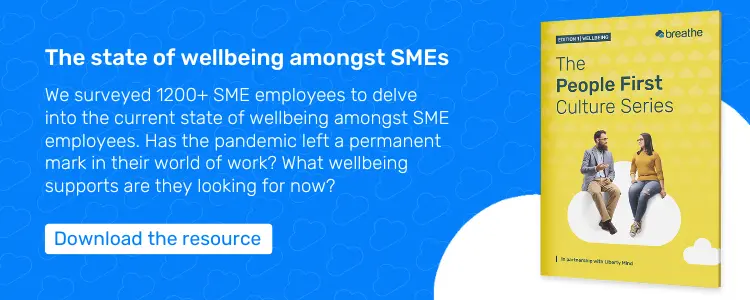In smaller companies, it can be tempting to contact an employee whilst they're off sick. Perhaps they’re the only one who knows the name of that important contact who works for your prospective client. Or maybe they are the only person who can remind you what the final decision was about the team budget.
It's always the right thing to refrain from contacting employees who are sick - because however much you absolutely must have that information, their health must always come first. And that's just one of the reasons not to contact them
Can employers contact employees on sick leave?
In short, yes, employers can contact employees who are off sick - but there are some guidelines to consider when doing so.
ACAS provides guidance for employers around contacting employees on sick leave. ACAS guidance states that employer and employee should stay in regular contact during absence (particularly if the employee is on long-term sickness absence).
While contacting employees about work matters is generally discouraged, it's important to keep a line of communication open while they're off sick. This is so you can stay updated on their health, and so they can stay in the know of developments in the wider business. At the start of the illness, you should agree:
-
How often contact should occur
-
What medium will be used (phone, email, face-to-face)
-
Who should get in touch with the employee
Check out our statutory sick pay calculator here
Why it's important to maintain contact with an employee while they're off sick
ACAS advises that keeping in contact is a way of checking on the employee's wellbeing, along with seeing if they need any support. This can also be an opportunity to discuss any updates or changes happening at work that the employee needs to know about.
There isn't any formal guidance about contacting employees around less pressing workplace matters - but we think your company culture should do the talking here.
Is it okay to talk to employees about their workload while they're off sick?
If it's not a business-critical question or information that the employee absolutely needs to know, avoid asking them where they got to on their latest project or deadline. If anything, asking questions such as this when your employee is ill could actually prolong their sickness and even cause them stress.
The best thing to do is to let them focus on their recovery and let them know you're here to support them.
Why you shouldn't contact employees who are off sick
Even if you think they're well enough to chat about work - or they even try to suggest they are - there are at least 6 key reasons why you shouldn't contact employees on sick leave:
1. They need adequate time to rest
It might sometimes seem like some illnesses are more valid than others. After all, contacting an employee suffering a mild headache or cough can't cause that much damage, surely?
In truth, not all illnesses are as they seem on the surface. And if the employee has decided to take a sick day, it's important to respect their reasons and give them the space to recuperate. This remains the case even if they don't have a sick note. If they're trying to recover, getting in touch is not going to alleviate any of the stress they're under.
2. It could aggravate their illness
While you may not mean to, contacting an employee about work matters while they're sick could exert pressure on them to come back before they're ready. You might make them feel guilty for being off, and worry about coming back before they're truly able to. This is particularly dangerous if the employee has a contagious illness that could end up spreading around the business.
Ultimately, the employee isn't going to be very productive for the extra day or two they've worked while ill. But the consequences of that to the business could vastly outweigh any gains you get.
Read more: Do you know how to handle complex sickness absences?
3. You could be pressuring staff to return too soon
According to our sickness report, Breathe found that more than half (52%) of UK employees answered work emails while they were off sick or away on annual leave. This 'always on' culture is particularly prevalent in our working lives today.
Today, employees regularly download collaboration and email apps on their phones – but this can make it difficult to disconnect from work. It's too easy to tap out a quick email reply on non-working days or to check for messages just before we go to bed.
Contacting employees when they're sick can make this situation even worse, creating challenges for long-term productivity, motivation and health.
4. Contacting them while they're off proliferates the 'always on' culture
Of course, there's no guarantee the employee will even have the answers you're looking for. The documents, devices or files they need might only be accessible from the office. At the same time, they might have trouble remembering the answers to questions you ask, which could cause the employee further unnecessary stress.
5. They may not be able to help anyway
Some employees are happy to be contacted while they're off sick. But it does to some extent depend on why they're off. If they're recovering from a foot operation, then a call with the boss isn't going to be too taxing.
But if they have full-on flu, they may not even be able to take a call. Here's the issue: employers don't always know the full details. That's why it's better to simply give them the space they need to come back to work when they're ready.
The bottom line is that it's not up to you to determine why employees are off sick, or if their reasons are genuine. That's why it's always best to give them the space and time to recover, without placing undue stress on them while they're off.
6. It's simply not fair - and could be seen as harassment
You should always exercise caution before you contact an employee while they're off sick. First, assess why you need to contact them, what impact it will have and whether it can wait.
Of course, there are always some situations when it is necessary to contact staff who are off sick. If, for example, you're undergoing changes that could have resounding consequences on the individual or the business, then it would be wise to get in touch.
Equally, maintaining regular, arranged contact with employees off sick will help many feel valued and not forgotten.
And that can all add up to making a world of difference to your company culture and the wellbeing of the people who make up your company.
But these are just the headlines: There's much more to each of these 6 reasons...
Best practices in employee communication while they're on sick leave
Contacting employees during sick leave should always be done with care. Whether it’s a short-term illness or long-term sickness absence, clear communication helps everyone feel supported.
Here are a few helpful practices to follow:
-
Agree on how and when contact will happen from the start
-
Make sure the purpose of contact is supportive, not work-focused
-
Keep things simple, and put the employee’s wellbeing first
Keeping in touch should never feel like a pressure. Instead, it should help the employee stay connected and feel valued.
What should employers do if an employee misses critical updates while on sick leave?
If an employee misses important updates during sickness absence, the best approach is to keep a record of what they need to know. Then, when they’re back, arrange a quick catch-up to bring them up to speed.
If it’s a key update that relates to company policy, their role or any decisions that could directly affect them, it’s okay to get in touch. Just make sure the message is clear, considerate and focused on keeping them in the loop, not asking anything from them.
As always, their wellbeing comes first.
How can employers support employees on sick leave?
Supporting someone during sick leave means putting their wellbeing first. It doesn’t always mean checking in - sometimes, it’s about giving them the space to rest, while quietly making sure they have what they need when they’re ready.
Here are a few ways to help:
-
Share access to your sickness absence policy, and explain what statutory sick pay or company sick pay they’re entitled to
-
Let them know about support available, such as counselling, occupational health or wellbeing resources
-
Be open to flexible working or a phased return when they’re ready
-
Make sure any requests for medical evidence are clear, necessary and handled with care
Every situation is different, but a little care, clarity and flexibility can go a long way in helping someone feel supported and ready to come back.
Can contacting an employee while they're off sick be considered harassment?
Although there are no laws forbidding employers contacting their employees while they’re off sick, if contact becomes excessive and if boundaries aren’t clearly established, there is a possibility for this to be considered harassment.
How to ensure contacting employees off sick doesn't look or feel like harassment
It’s natural for employees to feel like they are being harassed if they’re getting 1,001 questions while they’re off. Equally, employers can feel uncomfortable contacting employees on sick leave for fear of harassing them while they recover.
But it doesn’t have to be that way—you just need to establish some simple expectations for both parties.
1. How often should the employer contact the employee?
It’s important for employers to keep in contact with employees while they’re off sick. It’s just a question of how often—and this will depend on the type of leave the employee is on.
Sensitive and previously arranged contact can often put a longer-term sick employee at ease and stop them feeling isolated and out of touch. Facilitating the logistics of a smooth return to work is easier when there has been some level of contact throughout the absence.
2. How will the employer be contacting the employee?
Consider the best approach for all parties. Is it best to contact them over the phone? Over email? Or face-to-face (particularly if it’s over a long period of time)?
3. Who will be contacting the employee while they’re on sick leave?
Keeping the conversation to one consistent contact is good for both the employee, and the employer. The employee then knows exactly who to contact if need be, and can trust that this one person will have the full picture of their situation. After all, no-one likes having to re-explain themselves time and again to different people.
For employers, having one consistent contact for the employee off sick means it's clear who is responsible for maintaining that contact, and keeping the business updated. Most of the time, this person will be the manager of the employee on sick leave.
Put people, their health and wellbeing first
Bottom line, you should always exercise caution before you contact an employee whilst they're off sick. First, assess why you need to contact them, what impact it will have and whether it can wait.
Of course, there are always some situations when it is necessary to contact staff who are off sick. If, for example, you’re undergoing changes that could have resounding consequences on the individual or the business, then it would be wise to get in touch. Equally, maintaining regular, arranged contact with employees off sick will help many feel valued and not forgotten.
And that can all add up to making a world of difference to your company culture and the wellbeing of the people who make up your company.

Author: Aimée Brougham-Chandler
An IDM-certified Digital Copywriter (2023) & English Language & Literature graduate (BA Hons), Aimée is Breathe's Content Assistant. With 3 years' content marketing experience, Aimée has a passion for writing - and providing SME HR teams with solutions to their problems. She enjoys delving into & demystifying all things HR: from employee performance to health and wellbeing, leave to company culture & much more.





.webp)
